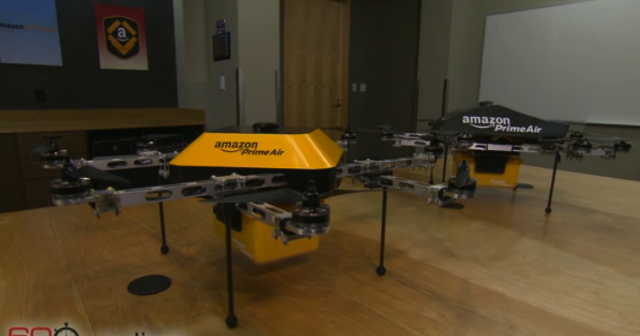India, not US, will be the launch-pad for Amazon’s plan to deliver packages using drones, or unmanned aerial vehicles, according to two people aware of the development. The US-based e-tailer will debut its drone delivery service with trials in Mumbai and Bangalore, cities where it has warehouses, the sources said on condition of anonymity.
Last December, Amazon showcased its Prime Air drone to the world with much fanfare. Since then, questions have been raised about the plausibility of such an idea, but the company appears to be keen on making headway.
“It could be as early as Diwali,” said one of the sources. Amazon said in a statement that it does “not comment on what we may or may not do in the future”. Amazon’s Prime Air is an octocopter, a drone fitted with eight rotors. Most recently, Amazon had said it is developing vehicles that weigh less than 25 kg and travel at over 80 kmph. The drone will carry a payload of up to 2.26 kg, which covers 86% of products sold on Amazon.
Top-selling products such as mobiles and books will likely be delivered within 90 minutes-3 hours for select customers. “With regard to consumer acceptance, the good news is that people are not very familiar with the concept (of drones) and won’t start with a bias against it,” said Kartik Hosanagar, associate professor of Internet commerce at The Wharton School of the University of Pennsylvania.
Seattle-based Amazon, founded by billionaire entrepreneur Jeff Bezos, is challenging Flipkart for leadership of India’s online retail market, which is estimated by Crisil to be worth Rs 50,000 crore by 2016. If Amazon uses drones to deliver even one package, it will be a huge publicity coup for the US-based firm, helping it upstage Flipkart just when sales will spike because of the festival season.
India is an attractive test bed for Amazon because the country still hasn’t woken up to the need for rules that will govern the use of unmanned aerial vehicles (UAVs). In the US, on the other hand, companies such as Amazon are not allowed to fly drones outdoors.
The Directorate General of Civil Aviation said it was not aware of any such plan by Amazon. Drone operators in India said they don’t obtain permits from DGCA for purposes such as aerial photography, surveying sites and wild life protection.
While the feasibility of operating drones in India exists, it is not without challenges. “Many companies in India have thought about this. But all are worried about the safety aspect,” said Pritam Ashutosh Sahu of Bangalore-based Edall Systems, which builds drones and also trains students on the technology.
Sahu said the drone has to be tested for flying within cities, and that losing communication with the drone is a very real possibility. “It can crash into a building, or might attract untoward attention,” said the 28-year-old graduate of aeronautical engineering from Anna University.
Hosanagar of Wharton observed that lack of familiarity with the concept may also mean any mishap, or even the perceived threat of a mishap, has the potential to be misunderstood.
“The regulatory reactions to the technology may be fickle and can change with any untoward event.” He added, “All said and done, India would certainly be an interesting choice,” but observed that Amazon would have to watch for regulatory compliance. “A better market would be where regulators lead when it comes to technology use and where consumers have been traditional early adopters.”Read more at:

